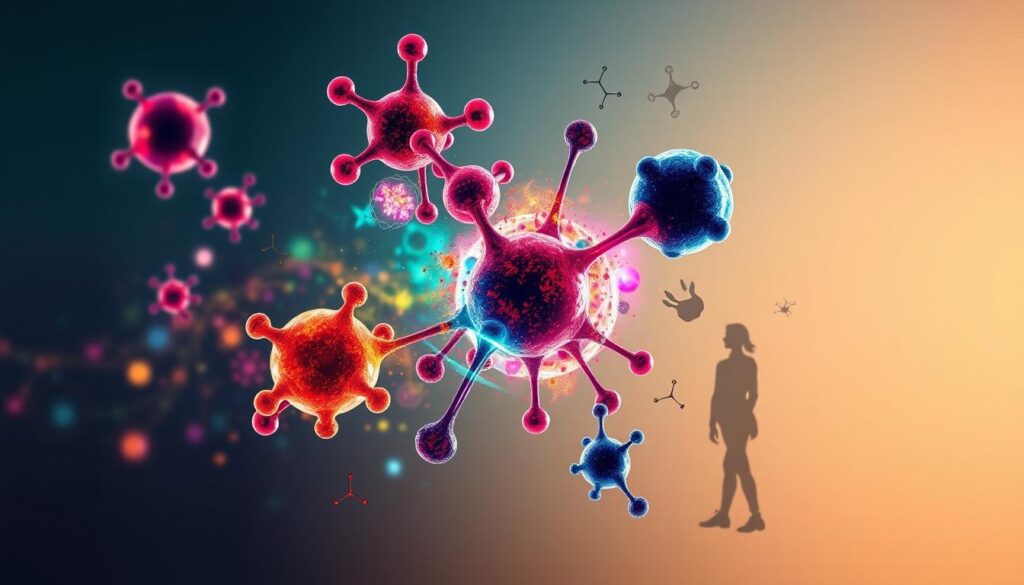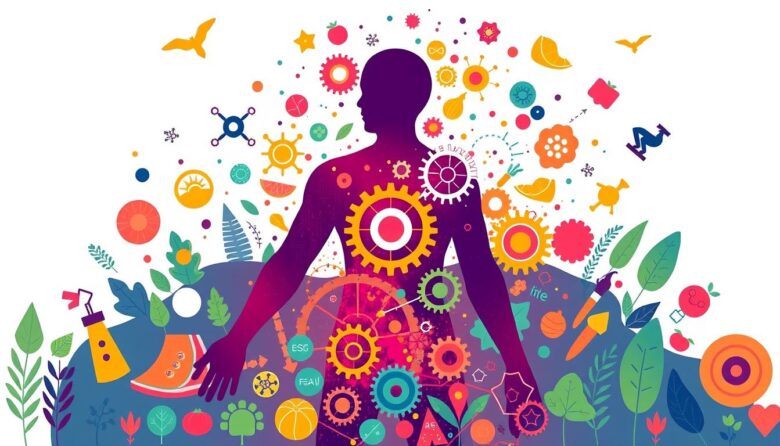Testosterone is a key hormone for men’s sexual health. It affects libido, erectile function, and vitality. Produced mainly in the testicles, it’s vital for male sexual development and function. As men get older, testosterone levels drop, affecting sexual performance and overall health.
In this article, we’ll dive into how testosterone and sexual health are connected. We’ll look at ways to keep hormone levels balanced for better vitality and sexual function.
Testosterone is essential for male sexual function. It impacts everything from sexual desire to being able to get an erection. As men hit their 30s and 40s, testosterone levels often decrease.
This can lead to changes in sexual health and overall well-being. It’s important for men to understand the link between testosterone and sexual function. This knowledge helps them keep their sexual health and overall wellness in check.
The Fundamentals of Testosterone Health
Understanding testosterone health is key for men’s sexual and overall wellbeing. Testosterone, the main male hormone, controls many body functions. It affects sexual development and brain function.
What Defines Normal Testosterone Levels
Testosterone levels in men are between 300 to 1,000 nanograms per deciliter (ng/dL). These numbers can change due to age, body type, and health issues. Keeping natural testosterone support and hormone balance is crucial for health.
Key Functions in Male Sexual Development
Testosterone is vital for male growth, affecting puberty, muscle, bone, and sperm. It helps develop male organs and secondary sex traits like facial hair.
The Relationship Between Age and Testosterone Production
Testosterone levels drop about 1% each year after 30. This decline can affect health, including sex, body shape, and overall wellbeing. Knowing this helps address testosterone issues and support natural testosterone support and hormone balance for men with age.
By focusing on testosterone health, men can improve wellbeing, sex life, and hormonal balance. This is important as they age naturally.
Impact of Testosterone on Sexual Function and Performance
Testosterone is key for a man’s sexual health, especially after 40. It affects libido, erectile function, and sexual satisfaction. Low testosterone can cause low sex drive, trouble getting an erection, and poor sexual performance. This can hurt a man’s confidence and quality of life.
The link between testosterone and sex is complex, involving physical and mental factors. Keeping testosterone levels healthy can boost sexual health, confidence, and overall well-being. Studies show testosterone therapy can slightly improve erectile function in men with low levels.
| Statistic | Impact |
|---|---|
| By the age of 70, 30% of men will have low testosterone levels. | Increased risk of sexual dysfunction and overall health issues. |
| Erectile dysfunction (ED) affects 1 in 5 men, with the frequency increasing with age and the prevalence of co-morbidities. | Significant impact on sexual performance and quality of life. |
| Men with low testosterone levels ( | Underscores the importance of maintaining healthy testosterone levels. |
Keeping testosterone health and male vitality over 40 in check is key for a good sex life. Understanding how testosterone affects sex can help men address imbalances. This way, they can improve their sexual well-being.

Signs and Symptoms of Testosterone Imbalance
Keeping natural testosterone support in balance is key for men’s health. But, hormonal imbalances can cause serious signs and symptoms. Let’s look at common signs of low testosterone and what might cause these issues.
Common Indicators of Low Testosterone
- Reduced sex drive or libido
- Erectile dysfunction
- Fatigue and lack of energy
- Mood changes, such as irritability or depression
- Decreased muscle mass and strength
- Reduced development of pubic hair (in children)
- Hot flashes
Risk Factors for Hormonal Disruption
Many things can lead to low testosterone and hormonal imbalances. Here are some:
- Aging: Testosterone levels drop as men get older.
- Obesity: Too much body fat can lower testosterone.
- Chronic Illnesses: Diseases like diabetes and HIV/AIDS can affect hormones.
- Certain Medications: Drugs like opioids and corticosteroids can mess with testosterone.
- Congenital Conditions: Disorders like Klinefelter’s syndrome can cause low testosterone.
- Anabolic Steroid Use: Misusing anabolic steroids can also lower testosterone.
When to Seek Professional Help
If you’re dealing with long-term symptoms of low testosterone, see a doctor. They can do tests to check your testosterone levels. Based on the results, they’ll suggest treatments to help balance your hormones and improve your health.
Conclusion
Keeping testosterone health in check is key for men’s sexual health and overall well-being. As men age, testosterone levels naturally drop. But knowing how this affects sex and spotting hormonal imbalances can help men stay active and healthy over 40.
Men can boost their testosterone by making lifestyle changes and getting professional help when needed. This approach helps them keep their sexual energy up as they get older. Talking to experts like Dr. John Spencer Ellis can offer tailored advice for better sex and health, making aging easier and more confident.
For a fulfilling life after 40, a comprehensive approach to testosterone health is essential. By following the advice in this article, men can manage their sexual health and enjoy life’s later years fully.










